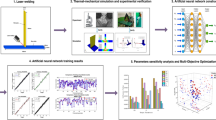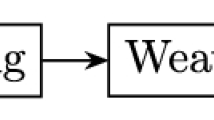Abstract
Reconfigurable manufacturing system (RMS) is a new manufacturing system paradigm suited to the era of mass customization. A RMS is able to change its configuration by physical reconfiguration and/or logical reconfiguration, to provide exact functionality and capacity needed for every demand period. For the reconfigurable flow line (RFL) in which multiple parts within the same part family can be produced simultaneously, optimal design of physical configuration (called configuration generation) and proper scheduling of multiple products are crucial to operate RFL in a cost-effective manner. Considering the close coupling between configuration generation and scheduling of multiple products for RFL, a new multi-objective mixed integer programming model is established for the integrated optimization of configuration generation and scheduling. The two conflicting objectives are to minimize total cost including capital cost and reconfiguration cost and to minimize total tardiness. The validity of the model is verified through case analysis implemented by LINGO software. Subsequently, the nondominated sorting genetic algorithm II (NSGA-II) is adopted to obtain a set of nondominated solutions. In the NSGA-II, a hybrid encoding method ensuring any chromosome a feasible solution is devised. Case study is utilized to illustrate the effectiveness of the NSGA-II for solving the problem. The case study also reveals that only if performing configuration generation and scheduling concurrently can a set of solutions balancing cost and tardiness be identified effectively for the RFL.
Similar content being viewed by others
References
Koren Y, Heisel U, Jovane F (1999) Reconfigurable manufacturing systems. Annal CIRP 48(2):527–540
Mehrabi MG, Ulsoy AG, Koren Y, Heytler P (2002) Trends and perspectives in flexible and reconfigurable manufacturing systems. J Intell Manuf 13(2):135–146
EIMaraghy HA (2006) Flexible and reconfigurable manufacturing systems paradigms. Int J Flex Manuf Syst 17(4):261–176
Goyal KK, Jain P, Jain M (2012) Optimal configuration selection for reconfigurable manufacturing system using NSGA II and TOPSIS. Int J Prod Res 50(15):4175–4191
Bi Z, Lang S, Shen W, Wang L (2008) Reconfigurable manufacturing systems: the state of the art. Int J Prod Res 46(4):967–992
Ye H, Liang M (2006) Simultaneous modular product scheduling and manufacturing cell reconfiguration using a genetic algorithm. J Manuf Sci Eng 128(4):984–995
Tang L (2005) Design and reconfiguration of RMS for part family. University of Michigan, Ann Arbor, MI, USA
Youssef AMA, EIMaraghy HA (2006) Modelling and optimization of multiple-aspect RMS configurations. Int J Prod Res 44(22):4929–4958
Dou J, Dai X, Meng Z (2010) Optimisation for multi-part flow-line configuration of reconfigurable manufacturing system using GA. Int J Prod Res 48(14):4071–4100
Dou J, Dai X, Meng Z (2011) A GA-based approach for optimizing single-part flow-line configurations of RMS. J Intell Manuf 22(2):301–317
Wang H (2005) Flexible flow shop scheduling: optimum, heuristics and artificial intelligence solutions. Expert Syst 22(2):78–85
Sawik T (2012) Batch versus cyclic scheduling of flexible flow shops by mixed-integer programming. Int J Prod Res 30(18):5017–5034
Singh MR, Mahapatra S, Mishra K (2013) A novel swarm optimiser for flexible flow shop scheduling. Int J Swarm Intell 1(1):51–69
Deb K, Pratap A, Agarwal S, Meyarivan T (2002) A fast and elitist multiobjective genetic algorithm: NSGA-II. IEEE Trans Evol Comput 6(2):182–197
Babu AS (2013) Reconfigurations of manufacturing systems—an empirical study on concepts, research, and applications. Int J Adv Manuf Technol 66(1–4):107–124
Renzi C, Leali F, Cavazzuti M, Andrisano AO (2014) A review on artificial intelligence applications to the optimal design of dedicated and reconfigurable manufacturing systems. Int J Adv Manuf Technol 72:403–418
Son SY (2000) Design principles and methodologies for reconfigurable machining systems. University of Michigan, Ann Arbor, MI
Spicer P, Carlo HJ (2007) Integrating reconfiguration cost into the design of multi-period scalable reconfigurable manufacturing systems. J Manuf Sci Eng 129(1):202–210
Dou J, Dai X, Meng Z (2009) Graph theory-based approach to optimize single-product flow-line configurations of rms. Int J Adv Manuf Technol 41(9):916–931
Manira M, Pakkirisamy V, Jeyapaul R (2015) An ant colony optimization–based approach for a single-product flow-line reconfigurable manufacturing systems. Proc Inst Mech Eng B: J Eng Manuf. doi:10.1177/0954405415585260
Youssef AMA (2006) Optimal configuration selection for reconfigurable manufacturing systems. University of Windsor, Windsor, Ontario, Canada
Youssef AMA, EIMaraghy HA (2008) Availability consideration in the optimal selection of multiple-aspect RMS configurations. Int J Prod Res 46(21):5849–5882
Saxena LK, Jain PK (2012) A model and optimisation approach for reconfigurable manufacturing system configuration design. Int J Prod Res 50(12):3359–3381
Bryan A, Hu S, Koren Y (2013) Assembly system reconfiguration planning. J Manuf Sci Eng 135(4):1–12
Hasan F, Jain P, Kumar D (2014) Optimum configuration selection in reconfigurable manufacturing system involving multiple part families. OPSEARCH 52(2):297–311
Bensmaine A, Dahane M, Benyoucef L (2013) A non-dominated sorting genetic algorithm based approach for optimal machines selection in reconfigurable manufacturing environment. Comput Ind Eng 66(3):519–524
Azab A, ElMaraghy H (2007) Mathematical modeling for reconfigurable process planning. CIRP Ann Manuf Technol 56(1):467–472
Shabaka A, ElMaraghy H (2008) A model for generating optimal process plans in RMS. Int J Comput Integr Manuf 21(2):180–194
Musharavati F, Hamouda A (2011) Modified genetic algorithms for manufacturing process planning in multiple parts manufacturing lines. Expert Syst Appl 38(9):10770–10779
Musharavati F, Hamouda A (2012) Simulated annealing with auxiliary knowledge for process planning optimization in reconfigurable manufacturing. Robot Comput Integr Manuf 28(2):113–131
Bensmaine A, Dahane M, Benyoucef L (2014) A new heuristic for integrated process planning and scheduling in reconfigurable manufacturing systems. Int J Prod Res 52(12):3583–3594
Chaube A, Benyoucef L, Tiwari MK (2012) An adapted NSGA-2 algorithm based dynamic process plan generation for a reconfigurable manufacturing system. J Intell Manuf 23(4):1141–1155
Xie N, Li A (2006) Reconfigurable production line modeling and scheduling using petri nets and genetic algorithm. Chin J Mech Eng(English Edition) 19(3):362–367
Yu JM, Doh HH, Kim JS, Kwon YJ, Lee DH, Nam SH (2013) Input sequencing and scheduling for a reconfigurable manufacturing system with a limited number of fixtures. Int J Adv Manuf Technol 67(1–4):157–169
Bi Z, Lang S, Verner M, Orban P (2008) Development of reconfigurable machines. Int J Adv Manuf Technol 39(11):1227–1251
Deb K (2001) Multi-objective optimization using evolutionary algorithms. John Wiley & Sons
Author information
Authors and Affiliations
Corresponding author
Rights and permissions
About this article
Cite this article
Dou, J., Li, J. & Su, C. Bi-objective optimization of integrating configuration generation and scheduling for reconfigurable flow lines using NSGA-II. Int J Adv Manuf Technol 86, 1945–1962 (2016). https://doi.org/10.1007/s00170-015-8291-8
Received:
Accepted:
Published:
Issue Date:
DOI: https://doi.org/10.1007/s00170-015-8291-8




